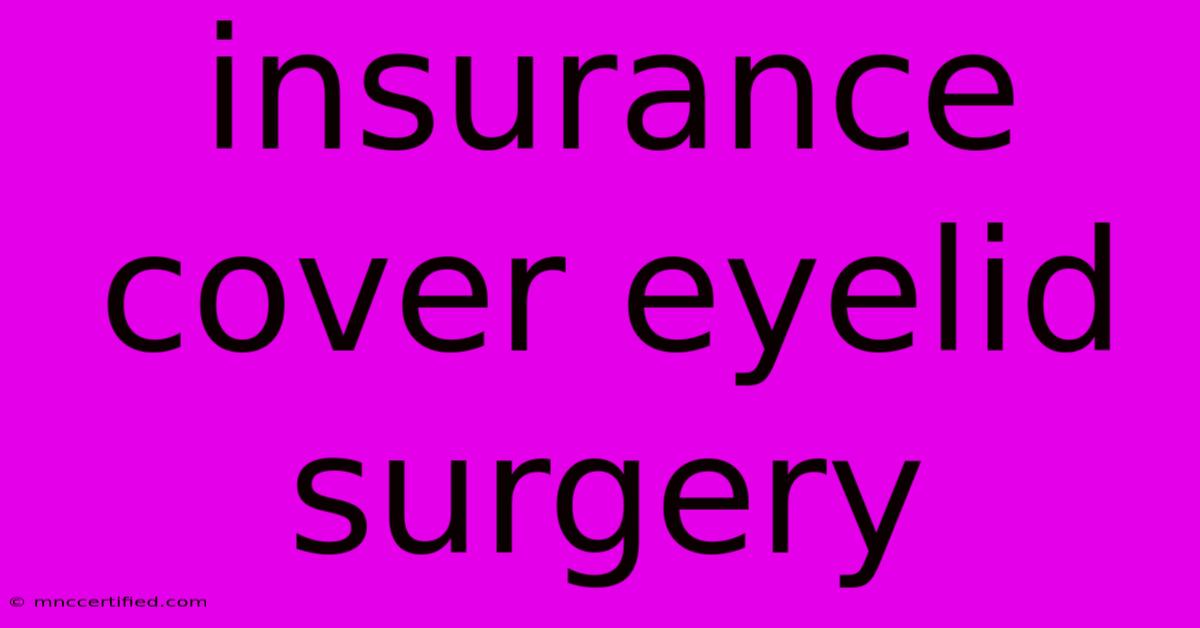Insurance Cover Eyelid Surgery

Table of Contents
Insurance Cover for Eyelid Surgery: A Comprehensive Guide
Eyelid surgery, or blepharoplasty, can dramatically improve your appearance and boost your confidence. However, the cost can be a significant barrier for many. Understanding your insurance coverage is crucial before proceeding. This comprehensive guide explores the intricacies of insurance cover for eyelid surgery, helping you navigate the process effectively.
Does Insurance Cover Eyelid Surgery?
The short answer is: it depends. Insurance companies typically only cover eyelid surgery when it's deemed medically necessary, not for purely cosmetic reasons. This means the procedure must address a medical condition impacting your vision or overall health.
Medically Necessary vs. Cosmetic Blepharoplasty
The key distinction lies in the reason for the surgery.
-
Medically Necessary: This refers to situations where excess eyelid skin or fat significantly impairs your vision, causing:
- Ptosis (drooping eyelids): This can obstruct your vision, making it difficult to see clearly.
- Excessive skin interfering with vision: Sagging skin can weigh down the eyelids, obstructing your peripheral vision or even causing double vision.
- Eye irritation or dryness: Excess skin can trap irritants and interfere with proper tear production, leading to dry eyes and discomfort.
- Corrected vision impairment caused by a medical condition: Surgery might be covered if eyelid issues stem from a pre-existing condition like Graves' ophthalmopathy (bulging eyes).
-
Cosmetic Blepharoplasty: This is solely for aesthetic improvement, addressing issues like wrinkles, sagging skin, or bags under the eyes without impacting vision or health. Cosmetic procedures are rarely covered by insurance.
Factors Affecting Insurance Coverage
Several factors influence whether your insurance company will cover eyelid surgery:
- Your Insurance Plan: Different plans have varying levels of coverage for medical procedures. Check your policy details carefully, focusing on sections related to surgical procedures and vision care.
- Pre-authorization: Most insurance providers require pre-authorization before approving any surgery. This involves submitting your medical records and obtaining approval from your insurance company before scheduling the procedure. Failing to do so could lead to significant out-of-pocket expenses.
- Doctor's Documentation: Your surgeon needs to provide comprehensive medical documentation demonstrating the medical necessity of the surgery. This documentation should clearly explain how the procedure will improve your vision or alleviate a medical condition. Vague or insufficient documentation can lead to claim denial.
- Diagnostic Testing: Your doctor may need to perform various tests (e.g., visual field tests) to support the claim of medically necessary surgery. These tests help demonstrate the impact of your eyelid condition on your vision.
How to Maximize Your Chances of Insurance Coverage
To increase your chances of securing insurance coverage:
- Consult with your ophthalmologist: Discuss your concerns with an ophthalmologist specializing in oculoplastic surgery (eyelid surgery). They can assess your condition and determine if surgery is medically necessary. They'll also assist in preparing the necessary documentation for your insurance company.
- Gather comprehensive medical records: Provide your doctor with a complete history of your eye condition, including any previous treatments or consultations.
- Understand your policy thoroughly: Review your insurance policy carefully, paying close attention to the terms and conditions concerning surgical procedures. Contact your insurance provider if you have any questions.
- Pre-authorization is key: Never schedule surgery without pre-authorization. Failure to obtain approval could result in substantial personal costs.
What to Do If Your Claim is Denied
If your insurance claim is denied, don't give up!
- Appeal the decision: Most insurance companies have an appeals process. Carefully review the denial letter and gather any additional supporting documentation to strengthen your case.
- Contact your insurance provider: Speak directly with a representative to discuss the reasons for denial and explore potential solutions.
- Consider alternative financing options: If your appeal is unsuccessful, explore options like medical financing plans or payment plans offered by your surgeon's office.
Conclusion: Navigating the Insurance Maze
Securing insurance coverage for eyelid surgery requires careful planning and communication. By understanding the distinctions between medically necessary and cosmetic procedures, diligently documenting your condition, and adhering to the pre-authorization process, you significantly increase your chances of minimizing out-of-pocket expenses. Remember, proactive communication with your doctor and insurance provider is key to a successful outcome.

Thank you for visiting our website wich cover about Insurance Cover Eyelid Surgery. We hope the information provided has been useful to you. Feel free to contact us if you have any questions or need further assistance. See you next time and dont miss to bookmark.
Featured Posts
-
All Price Insurance Cottonwood
Nov 27, 2024
-
Arsenal Thrash Sporting Cp 5 1
Nov 27, 2024
-
Flicks Brest Selection Young Defender Included
Nov 27, 2024
-
Feyenoord Vs Man City Game Prediction And Analysis
Nov 27, 2024
-
Man City Feyenoord 3 3 November 26th
Nov 27, 2024